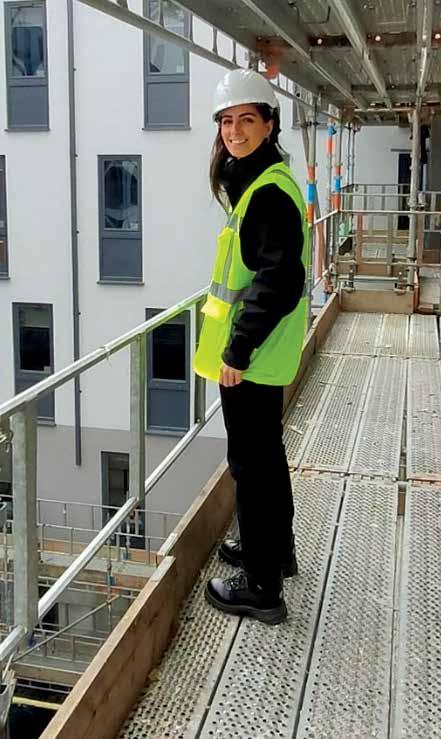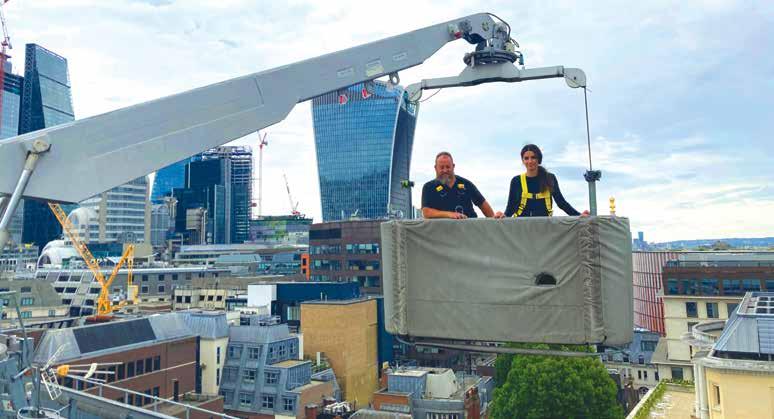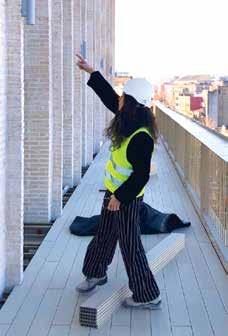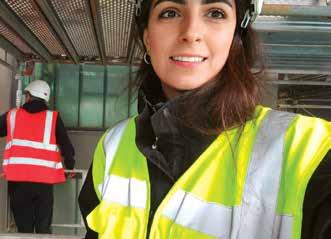
11 minute read
Women in Engineering: Tara Sabri’s Journey Sustainability in the Notebook World: A feature with Mohammad
Women in Engineering
Tara Sabri’s Journey
With no doubt, engineering is a male dominated industry. From undergraduate coursework to even real world experience, the field is catered towards the success, preference, and recognition of men. Women with the same educational background and work experiences are qualified by merit, but are often overlooked and excluded from the spotlight. Initiatives for female representation and giving women the space to also inspire others with their successes are catalysts to igniting change within the industry.
Opportunities to represent and recognize women like 2011 IC graduate Tara Sabri are necessary towards creating changes in the workplace and opening the dialogue on the topic of women in the engineering field. On this year’s International Women in Engineering Day, Tara was recently recognized as one of the top inspirational women engineers at Wintech, a prestigious facade engineering firm in London.
Her journey through architecture to facade engineering delves into the discussion of what the process has been like through her lens. Furthermore, her story highlights the questions of what it means to be a woman in this field on a personal and professional level, and the long term impact she hopes to have.
The Intro into the Field of Facade Engineering
Tara has always had a passion for design. In fact, she had started out in interior design which had little to do with the engineering field. Coming across facades changed the entire outlook of her career early on. “Facade is the element of the building that you see first”, she tells me. “It’s actually the only element that you see of the building when you’re on the outside walking on the street.”
Tara had started out with a different goal in mind. “I wanted to specialize in lighting design”, she said. But coming across facades changed everything.
“I thought it’s a field that is infinite. Where I can grow. There’s a lot of diversity, colors, and materials.” company in Spain. With confidence, she pitched herself to the employer and he agreed. She was the first junior who joined the company in Spain, and she adds that within time, other juniors began to be hired as well. Tara sponsored herself for 3 years in Spain to pursue this opportunity, which was her first experience of entering into the engineering industry. It was during this experience she truly got to learn a lot about facades and consulting, which played a major role in developing a solid background in the field. This job was also her first exposure to the gender disparity within the industry, as she reflects back on some key moments.
“I felt that he [her employer] didn’t give me the same opportunities” Tara states. “To travel, for example. We had projects in Morocco, Paris, Brussels, etc. And I couldn’t travel there. He preferred to send the men.”

Tara mentions that perhaps some of the reasons she was excluded from this could have been because her employer may have preferred someone with more experience, or that maybe given that she was an expat in Spain, he may have not have wanted to invest long term in her role in the company. Regardless of these reasons, she still felt as if she should have had the opportunities to travel and be present on these worksites. After all, she had been doing significant behind the scenes work.
Tara had worked on these international projects locally in Barcelona without getting the chance to observe the results of her efforts. “I was working on huge towers, and I couldn’t go. Actually, we were actually working with a Lebanese company called Glassline. The team members kept asking me, ‘when are you coming to Morocco?’ And I would tell them, hmm I don’t know”. Among her company, Tara was the only person who spoke French, and she felt that it would have been relevant for her to be there. After all, she was on all the calls and would even translate all the reports for her boss from Spanish.
With an itch for change, Tara felt like it was time to keep growing and developing her career. In September of 2021, she applied for the job at Wintech in London. “London was something I always dreamed of”.
Hands On at Wintech
Tara’s experience at Wintech has been a positive transition in her career path. “Here, I feel that I am very challenged professionally. They treat me like a man”, she says enthusiastically. On the contrary to her experience in Spain, Tara has gotten a fair share of hands-on experience.
“I go on site visits, to construction sites. Very very often. Once every 2 weeks I go to construction sites, I wear the helmet, the yellow fluorescent t-shirt you wear when you’re outside so people can see you.”
A big part of facade engineering consists of analyzing the structure and making sure there are no defects. In the process of doing so, engineers have to mount themselves on the cradle machines. Tara explains that traditionally, it wasn’t common for women to be on these machines. She laughs as she recounts an interaction she had with a man she was working with on the cradle during one of her London site visits.
“I’m the only woman between the workers, the people that are actually working on the facades. There’s the contractors, clients. It’s all men in the world of architecture. Here in this specialization of facade, it’s really unique.”
workplace seems to be progressing in their firm. On International Women in Engineering Day, Wintech made it a point to acknowledge the disparity within the field as a whole. Alongside Tara, they also spotlighted some of the other hard working women on their team.
“My company has 100 employees almost, and maybe at least 40 are women. Half of my office are women. So it’s really really nice. My company is making it a point to treat women like men. In my old office, it was 3 women and 7 men.”
Tara even points out that she had the chance to travel to Scotland for a project during the time she has been at Wintech.
According to Tara, the presence of women at her current workplace is valued.
“Women tend to be more organized. I can see the men appreciating our touch; Our precision, organization, order. We are more rigorous, and men appreciate this in my company.” I asked Tara how she personally feels about initiatives like that of Wintech to promote and recognize women engineers. Tara disagrees with the idea that such initiatives imply that women are less capable than their male counterparts. Having spaces and spotlighting successful women creates another necessary outlet for representation. Particularly in a field that fails to recognize women and their efforts collectively, this representation is rather pivotal towards making any changes in the industry.
I asked Tara the question of whether or not she feels that women are given the credit and acknowledgement because they are women, or because of their skillset. Her response: “Of course for the skills. We just bring another vision.”
Given that men are the ones primarily pursuing the engineering field, there’s an association that being an engineer isn’t necessarily suited towards women. Furthermore, for the women who are in the industry, there’s often the misconception that their work can strip them from their label of “femininity”, and this same stigma is what would limit them from being as successful as their male counterparts. Tara challenges that. “I can be an engineer and still be a woman and be feminine”, she tells me adamantly. Furthermore, seeing women on front pages and acknowledged in the media oriented world we are in today may even serve as inspiration to other girls to pursue this field as well. With more women in the field, there is bound to be more headway towards changing the current dynamic. “Women starting to work in this industry are going to encourage others to do it”, Tara states.
In Tara’s perspective, any level of change taking place in the industry begins at the academic level.
“Universities should accept equal amounts of men and women in a classroom. For example in architecture school, there are more men than women. This already gives the way for more men to have the opportunity.”
Another factor would be the previously mentioned spaces of female representation and opening up discussions regarding women as engineers in the early days of university years, all the way up to the actual work force.
“The confidence is needed to go in it. The more people talk about it, the more awareness. That’s why I’m happy to participate in those kinds of dialogues because I already did that with my office and I think it’s helpful for other younger generations.”

Making Headway and Room for Growth
Regardless of the great work Wintech is doing to change the gender disparity within its own spaces, there is a lot of room for progress to be made collectively within the industry. “We’re just starting, that’s for sure”, Tara tells me. In terms of the workplace, bringing change comes with companies bringing power to women to prove themselves. But this is where it can get tricky. If an employer refuses to hire or see any value of women on their team, there is automatically no space to prove a point in such an environment. Women can’t be the only ones advocating for themselves; in Tara’s perspective, there has to be collaboration between the dominant figures in the workplace.
“It depends on how open minded people are. If they believe in it to start this. If the employer doesn’t have the vision, it will never happen. It’s a joint effort between employers and a woman wanting to prove and believe in herself”. want to shape cities”, Tara told me. But apart from that she also hopes to be able to bring her passion for facade engineering back to Lebanon someday.
IC’s Impact
When Tara made her points regarding that changes that begin on an academic level are the most significant, she also reflected back on her time at IC. She started out at Ain Aar, and eventually transferred to Raas Beirut and graduated in the French program. She believes that her foundation at IC was foundational to her success and confidence in this field as a woman. “On a personal level, I’m learning a new field that is just starting in my home country. I feel that I can bring a lot with workshops and classes. Giving the experience of someone who worked in that field. It’s so rare, Lebanese people who are working in that field. No one I know is Lebanese in my field. Especially in facade consulting.”
“So many women start in school and they grow up without diversity. You grow up and you don’t know that you’re powerful enough and you don’t know your worth. I think that the diversity at school really helps in giving you the power to be like ‘ok I can do that’. Even I’m a woman, I can do that.”
IC’s emphasis on building strong character remains in its graduates for years to come. Particularly for Tara, the skills of confidence she gained can be attributed to her time here. “I mean look at me, I studied interior design and I’m now working as a facade engineer. You can be anyone”, she says.
IC is not only recognized for the academic front, but also for the multitude of ethnic and religious backgrounds, and the monumental school values it instills into children from an early age.
“Personality wise, IC empowers the students to have their own character. Choose their friends. Also the fact that IC gives you extracurricular activities and sports. All kinds of sports! The school culture in general lets you be whoever you want to be and this is nice because you go out of it and you’re confident.”
Tara’s Plans for the Future
“I wanted to be part of creating the landscape of cities. I In all of Lebanon, there is only one facade engineering firm, Glassline. But Tara’s field is facade consulting, and it doesn’t exist in the country. “Glassline, they build the facade. They actually have factories. To be a facade consultant is rare in our part of the world”, she tells me.
Tara is essentially a pioneer in her field in terms of Lebanon, and she’s also a woman who is making major headway in working towards change. She is firm in her stance that education is the key to successfully combating the gender disparity in the engineering industry. Like mentioned before, encouraging women to be in the field comes with the inspiration and recognition of successful women just like her.
“I would want to go towards the education part. I’m very excited to do that. It could bring a lot. Especially if they see a woman that has 1o years of experience in facade, maybe they can be like her.”
Tara’s ambitious energy stems from the fact that the playing field is entirely uneven for women on all fronts in engineering. She hopes to play a role in bettering the system from the earliest stages: the academic space.
Tara Sabri is inspirational on all fronts. From the dialogue of gender disparity and pioneering in an industry new to her home country, she is bound to make impactful change on her community. With women like Tara who are making waves and being recognized in the engineering field, there will be other women who can have the courage and confidence to pursue leaving their mark in the industry.









